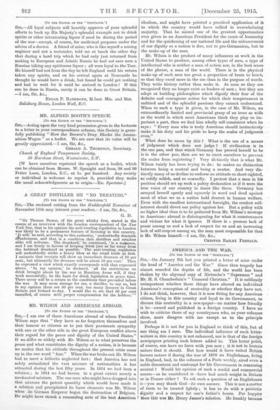MR. WILSON AND AMERICANS ABROAD.
[To THE EDITOR OF THE "SPECTATOR;'] Srn,—I am one of those Americans abroad of whom President Wilson says that " they have so far forgotten themselves and their honour as citizens as to put their passionate sympathy with one or the other side in the great European conflict above their regard for the peace and dignity of the United States." If we differ so widely with Mr. Wilson as to what preserves the peace and what constitutes the dignity of a nation, it is beoause we realize that his attitude throughout the present crisis sums up in the one word " fear." When the war broke out Mr. Wilson had to meet a hitherto neglected fact : that America has not safely assimilated the vast mixture of nationalities it has attracted during the last fifty years. In 1814 we had been a solution ; in 1914 we had becom to a great extent merely a mechanical mixture. The one man who might have dropped into that mixture the potent quantity which would have made it a solution and precipitated its baser elements was Mr. Wilson when ho German Emperor began the destruction of Belgium. He might have struck a resounding note of the best Anseriban idealism, and might have pointed a practical application of it to which the country would have rallied in overwhelming majority. That he missed one of the greatest opportunities ever given to an American President for the cause of humanity and for the quickening of our national life and the enhancement of our dignity as a nation is due, not to pro-Germanism, but to the make-up of the man.
Mr. Wilson is the product of many influences at work in the United States to produce, among other types of men, a typo of intellectual who is neither a man of action nor, in the best sense of the phrase, a man of the world. There is in the physical make-up of such men too great a proportion of brain to heart, so that they excel more in the use than in the purpose of words. They write history rather than make it. As soon as they are recognized they no longer exist as leaders of men ; but they are adept at building philosophies which dignify their fear of the definite and courageous action for which their temperament is unfitted and of the splendid passions they cannot understand. When to such a type is given, in the case of Mr. Wilson, an extraordinarily limited and provincial grasp of an issue as wide as the world in which most Americans think they play so im- portant a part, then we find him wholly self-consistent when he says " Every man who is truly American should instinctively make it his duty and his pride to keep the scales of judgment oven."
What does he mean by this ? What is the use of a means of judgment which does not judge ? If civilization is in the one pan, and that which Germany has proved herself to be is in the other pan, then are we to exert ourselves to prevent the scales from registering ? Very distinctly that is what Mr. Wilson vainly has been trying to do : he makes no distinction between being a neutral and being a neuter. And very dis. tinctly many of us decline to endorse an attitude so short-sighted, so coldly selfish, and so cowardly. I protest that a man in his position should set up such a paltry declaration as if it were the true voice of our country in times like these. Germany has arrayed herself openly and squarely in word and deed against most of what we as a nation hold dearest in human welfare. Even with the smallest international foresight, the crudest self interest should direct our policy against her. But a policy with no higher ideal than is to be gathered from Mr. Wilson's message to Americans abroad is disintegrating for what it countenances and vicious for what it ignores. If there is a present lack of pew among us and a lack of respect for us and an increasing lack of self-respect among us, the man most responsible for that is Mr. Wilson himself.—I am, Sir, &c.,
CHESTER BAILEY FERNALD.


































 Previous page
Previous page